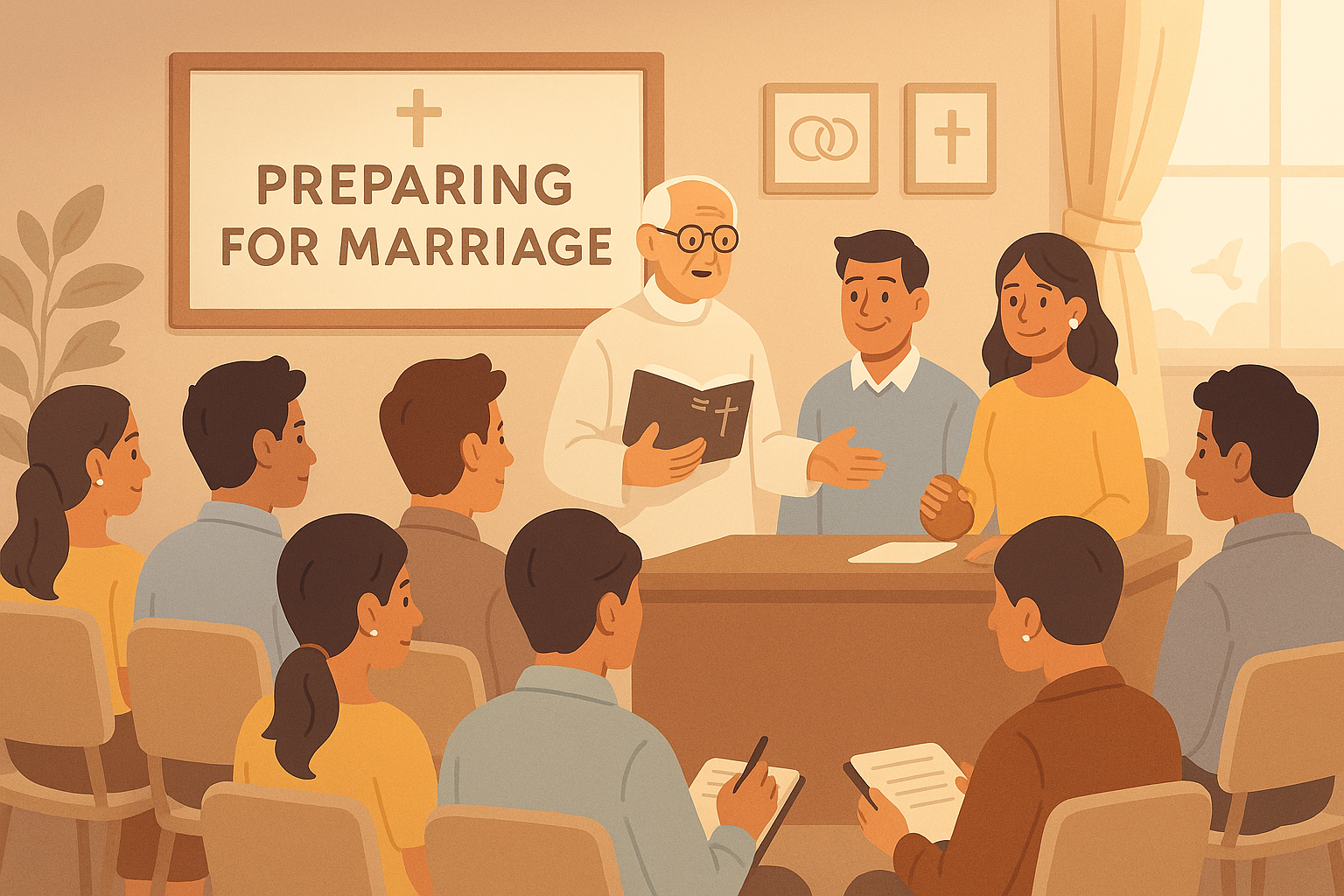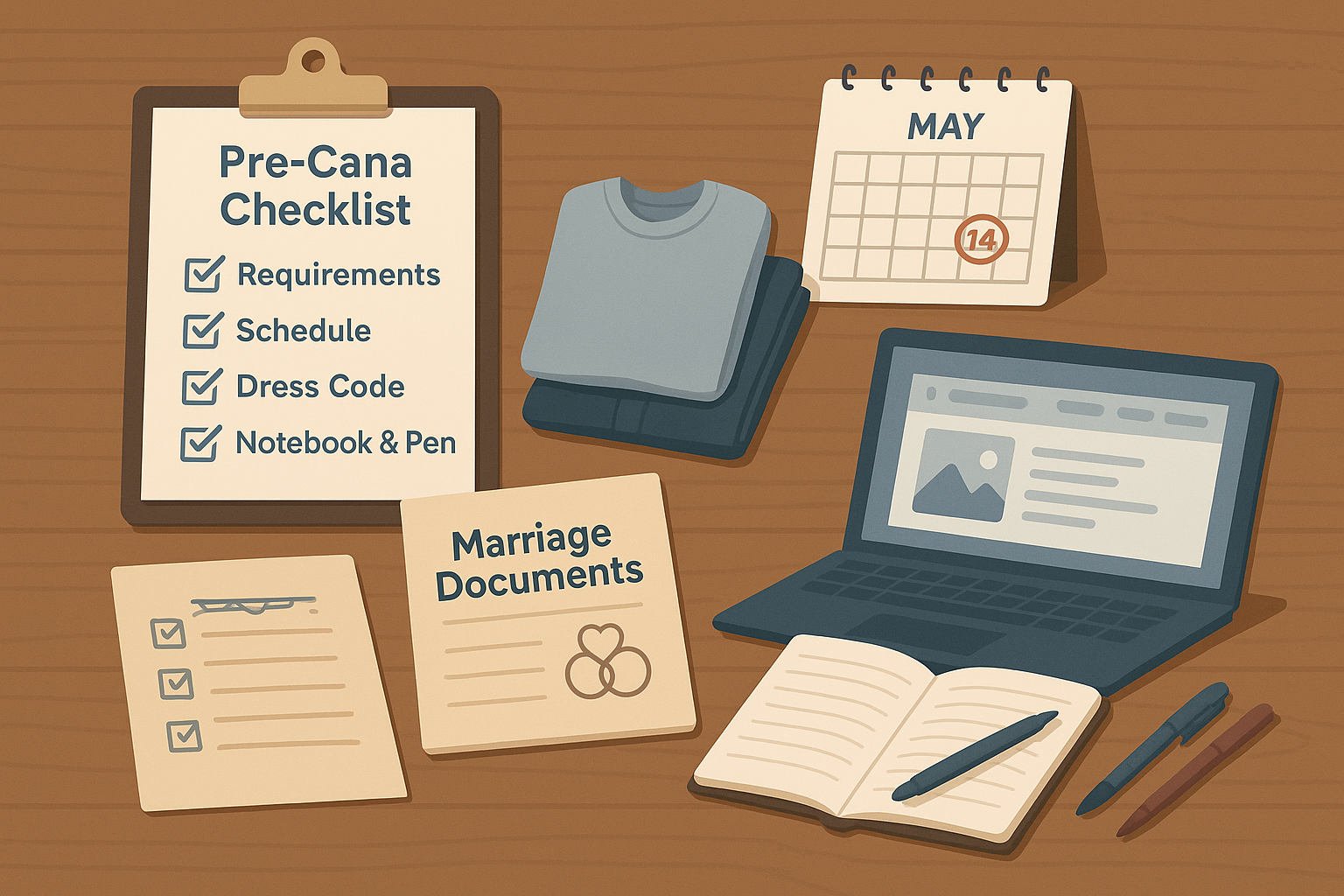
Philippine Pre‑Cana Seminars: What You Need to Know

Planning a wedding is one of life's most joyful journeys—filled with excitement, dreams, and a hopeful vision for the future. Amidst all the flower arrangements, venue bookings, and gown fittings, it's equally vital to prepare for the lifelong commitment marriage brings. In the Philippines, a key part of this preparation is attending a pre‑Cana seminar—a spiritual and practical guide to building a strong foundation for married life. Let's explore what these seminars involve, their importance, and what engaged couples can expect.
What Is a Pre‑Cana Seminar?
Grounded in the biblical story of Cana where Jesus performed his first miracle, pre‑Cana seminars are structured programs designed to equip couples for the sacrament of marriage within the Catholic Church. Especially in a predominantly Catholic country like the Philippines, these courses are taken seriously.
Conducted by parishes or church-affiliated organizations, pre‑Cana usually consists of lectures, group discussions, interactive activities, and personal reflection. Experienced facilitators—priests, counselors, and married couples—guide participants through important topics like communication, finances, intimacy, and spiritual unity. Through these sessions, couples gain valuable insight into themselves, their future roles, and the sacred nature of their commitment.
Is Pre‑Cana Mandatory?
Yes. In the Philippines, attending a pre‑Cana seminar, alongside a canonical interview, is a requirement for receiving the Sacrament of Matrimony in the Catholic Church. Even if only one person in the couple is Catholic, completing the pre‑Cana seminar is still necessary for a church wedding.
Why is It Important?
- Strengthening your foundation: These seminars create a safe space for couples to examine their shared goals, values, and expectations. By shining light on potential challenges early, they help couples learn how to navigate conflict and make sound decisions together.
- Spiritual enrichment: Beyond practical topics, pre‑Cana delves into marriage as a sacred covenant. Through reflections on faith and prayer, couples deepen their spiritual connection—inviting God's guidance into every stage of their life together.

What Happens During a Philippine Pre‑Cana Seminar?
Pre‑Cana sessions may vary—from a single-day workshop to a weekend retreat—but they share common core elements guided by skilled facilitators:
- Communication Skills: Learning to listen actively and speak honestly through role-play and discussions.
- Conflict Resolution: Strategies for resolving disagreements respectfully and constructively.
- Financial Management: Practical advice on budgeting, planning for the future, and aligning values around money.
- Intimacy: Exploring emotional, physical, and spiritual closeness to nurture a deeper bond.
- Spiritual Foundations: Reflections on the sacrament of marriage, prayer partnership, and the role of faith in daily life.
Facilitators often include priests, licensed counselors, and couples married for several years, offering varied perspectives and real-life wisdom.
Is It Worth It?
Absolutely. While required by the Church, the real value of pre‑Cana goes far beyond ticking a box. Couples frequently report that these sessions spark deeper understanding, empathy, and mutual respect. The combination of shared experiences and guided exploration cultivates intimacy, mutual trust, and strengthened commitment—skills that benefit a lifetime together.
How Much Do Pre‑Cana Seminars Cost?
Fees vary depending on the venue, duration, and organizer. Many parishes offer pre‑Cana free of charge as part of their pastoral mission. Others may charge a modest fee (often between ₱500 and ₱1,500) to cover materials, facility use, and facilitator stipends. Regardless of cost, the true return on investment lies in the lifelong relationship skills couples acquire.

What to Prepare for a Pre‑Cana Seminar
To maximize the benefits, come ready with:
- Registration completed—usually through your parish.
- A convenient schedule—coordinate with your partner and other commitments.
- All necessary documents, such as baptismal and birth certificates (often required).
- Open mindset—actively participate in discussions and exercises.
- Advance communication—talk with your partner about hopes, expectations, and concerns.
- Logistics planned—transport, meals, accommodation (if overnight).
- Attire that's comfortable and respectful—check for any guidelines.
- Necessary materials—notebook, pen, or any pre-seminar handouts.
- Prepared questions—bring topics you'd like to discuss.
- Reasonable expectations—approach the seminar as a journey, not just a requirement.
When couples invest time and energy into this preparation, they enter married life with deeper empathy, resilience, and readiness to grow together.

Where to Attend a Pre‑Cana Seminar in the Philippines
Pre‑Cana seminars are widely available across the Philippines, as almost every Catholic parish offers this essential service. Here's how to find the best option for you:
- Your Parish Church: The simplest and most common route is to attend the pre‑Cana seminar in the parish where your wedding will be held. This ensures your certificates and attendance are directly coordinated with your priest and wedding coordinator. Many parishes have set schedules for pre‑Cana, often on weekends, and some offer special arrangements for couples with unique circumstances.
- Other Parishes or Diocesan Centers: If your wedding parish doesn't offer regular seminars or if scheduling conflicts arise, you may attend a pre‑Cana seminar in another Catholic parish or diocesan family life office. Be sure to check in advance whether your wedding parish will honor certificates issued elsewhere.
- Accredited Catholic Organizations: Organizations such as the Catholic Bishops' Conference of the Philippines (CBCP) Family Life Apostolate, Couples for Christ, and other church-affiliated groups provide pre‑Cana programs, sometimes tailored for busy or long-distance couples.
- Online Pre‑Cana Seminars: In response to the COVID-19 pandemic, many parishes and organizations have begun offering online pre‑Cana seminars through video conferencing platforms. These are ideal for couples in different locations or with busy schedules, though you must verify with your parish if online attendance is accepted for your marriage requirements.
Tip: Always verify seminar schedules and requirements directly with your parish office or chosen organization to avoid any last-minute complications.
What Happens After the Pre‑Cana Seminar?
Upon completing the seminar, couples receive an official certificate of attendance or completion. This certificate is a vital document—one of the standard requirements for your church wedding application. Present it to your parish's marriage coordinator, who will include it in your marriage dossier along with your canonical interview results, baptismal certificates, and other documents.
This certificate not only satisfies a Church requirement but also symbolizes your commitment to prepare mindfully and spiritually for married life.
Frequently Asked Questions about Pre‑Cana in the Philippines
1. How long does a Pre‑Cana seminar usually last?
The duration can vary widely. Some parishes offer a one-day intensive session (typically lasting 6–8 hours), while others may spread the seminar over a weekend or several consecutive days. Online sessions may be divided into shorter modules to accommodate participants' schedules.
2. Can we attend the seminar separately if we're in different locations?
Some parishes and organizations allow couples to participate remotely or attend seminars in separate locations, especially if one partner is overseas or in another city. However, you must coordinate with your parish to ensure that they accept such arrangements and that you both receive valid certificates.
3. Is Pre‑Cana only for first-time marriages?
Pre‑Cana seminars are primarily designed for couples entering into marriage for the first time in the Catholic Church. However, those seeking convalidation (blessing) of a civil marriage or a second marriage (following Church annulment or the death of a spouse) may also be required to attend. Requirements may differ—consult your parish priest for guidance.
4. What if one of us isn't Catholic?
Even if only one partner is Catholic, both parties are generally expected to attend the pre‑Cana seminar if you wish to have a Catholic wedding in the Philippines. The experience offers both partners valuable insights into each other's beliefs and expectations for married life.
5. What if we miss a scheduled seminar?
If you miss your original schedule, you can usually re-register for the next available seminar. It's important to plan ahead—especially during peak wedding months when slots fill quickly.
6. Is there a dress code?
Most seminars require modest, comfortable attire, as sessions may include prayer services or Mass. Always ask your parish if there are specific dress requirements.
Final Thoughts: More Than a Requirement
While many engaged couples approach the pre‑Cana seminar as just another item on their wedding checklist, its true value lies in the doors it opens for honest dialogue and mutual growth. By providing practical tools, spiritual guidance, and expert advice, pre‑Cana prepares couples to build a loving, resilient partnership that lasts a lifetime.
Remember: a beautiful wedding lasts a day, but a strong, faith-filled marriage is a lifelong journey. Approaching pre‑Cana with openness and enthusiasm not only fulfills a Church obligation but also honors the sacred commitment you're about to make.





